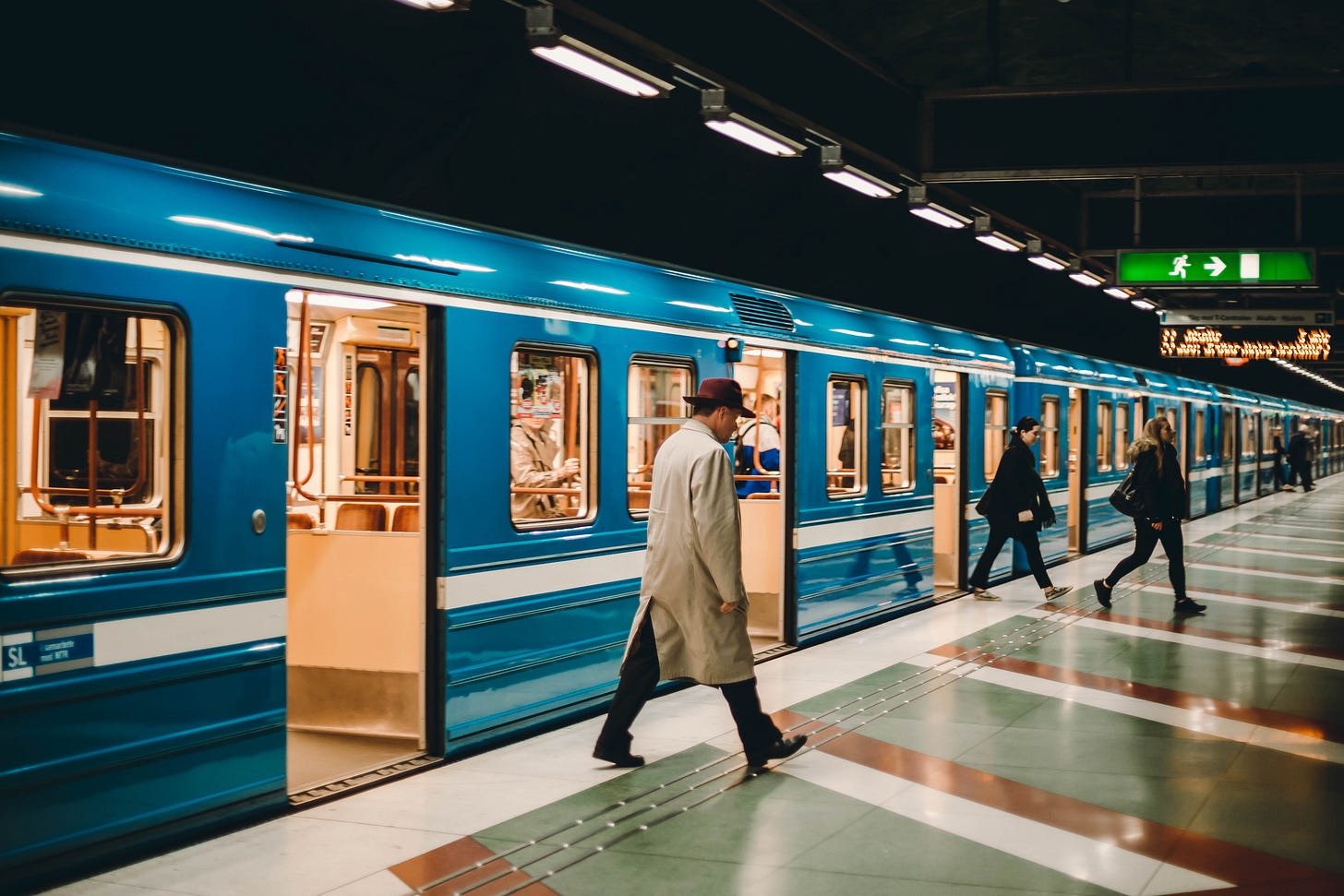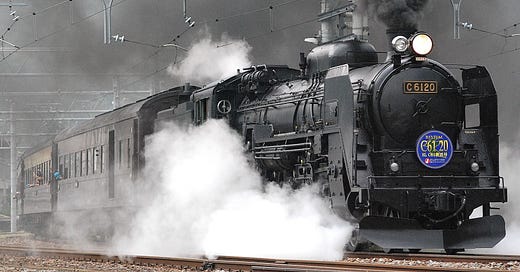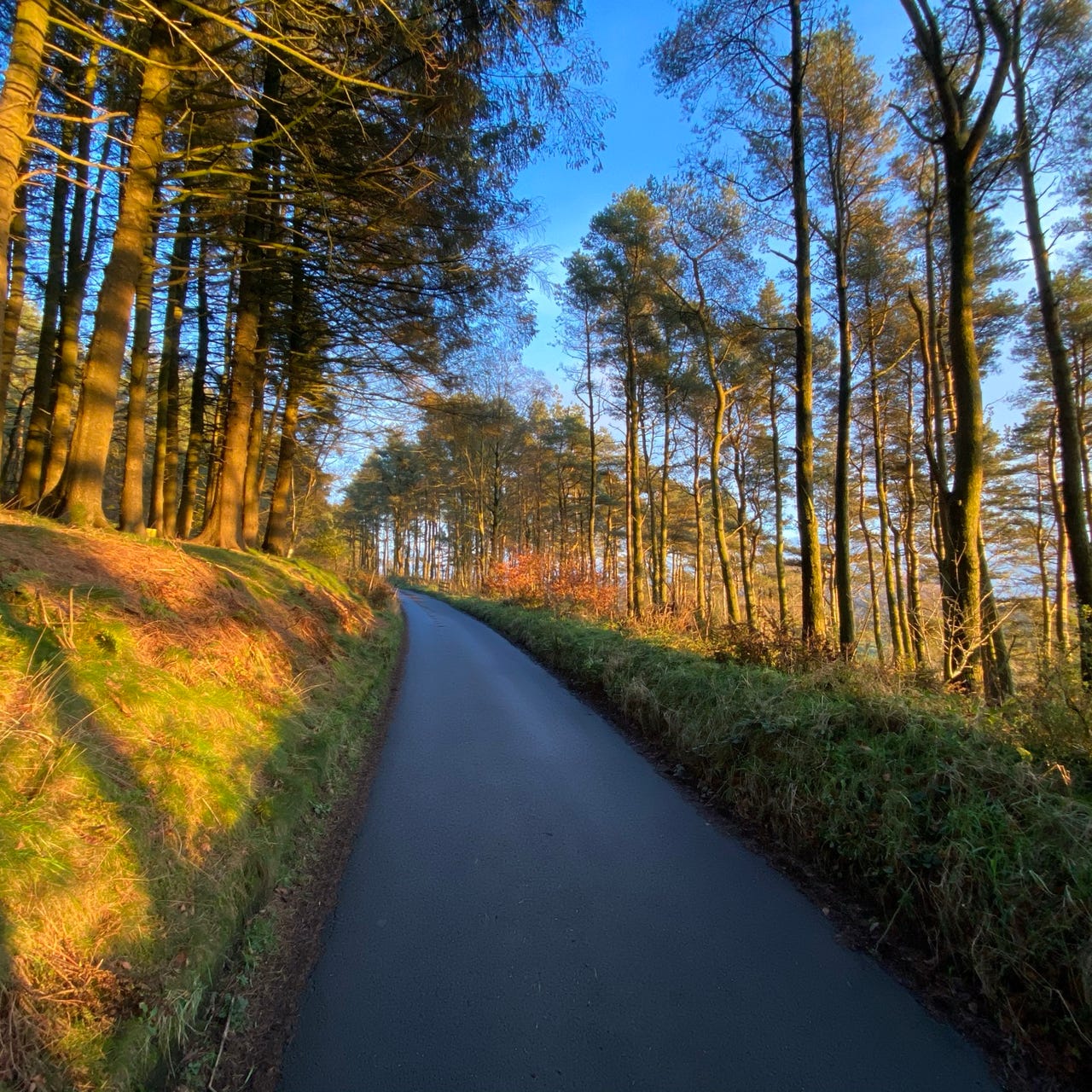Friday Notes - Taking the Train
A reflection on taking the train instead of a car; a prayer about moving in the world; call to action; and Friday Five - 5 lesser-know Substack newsletters to follow
I’m writing to you from London, Ontario, where I will be presenting a talk tomorrow to the United Church of Canada’s Antler River Watershed Region’s Spring Meeting. I will be presenting on what discipleship means in our time of climate emergency, and look forward to engaging conversations with people from this neck of the woods.
It is a long trip on the train to get to London from Ottawa. Including a stopover in Toronto and a 90-minute delay, it took me 11 hours to get here! However, I don’t regret them. Yes, it would have been a lot quicker to drive my car (6 hours plus stops). But I would not have had the chance to relax and read, do some reflection, and prepare for the event ahead. I would have eaten rushed meals at pit stops along the highway, instead of enjoying the countryside, farmers’ fields, and Lake Ontario out my window. I would have arrived at my hotel tired and frazzled from nighttime driving on the 401, instead of tired and happy from being met at the train by a friend, who waited so patiently despite the delay. (“Hey! I’m retired!” was her loving response).
Not only that, but if I had driven my car instead of taking the train, I would have put 124 kg CO2e into the atmosphere, instead of the 69 kg CO2e that was released. (These figures are per passenger on the train, and assuming one person in the car).[1] Thus, taking the train had the significant benefit of being the most low-carbon way for me to travel. (Flying would have released 176 kg CO2e).
It is interesting to me that not only was taking the train the best way to travel with respect to my carbon footprint, but it was also the better way to travel in terms of giving me more time to relax and reflect. It allowed me time to read a book, and to enjoy a show on Netflix. It even allowed me time to work! Via Rail, from which the above stats were taken, also points out the number of “productive hours” that you get on the train, versus a car or a plane. Whether I chose to use those productive hours for work or Netflix, the point is made: by taking the train, I had the chance to slow down, enjoy a beautiful trek through this part of the province, and reduce my stress.
It is not a coincidence that, with the increase in our fossil-fuel heavy way of doing things, we have had a rise in stress, less time for family and leisure, and increases in mental and physical health issues. Yes, it took me a lot longer to get to my destination than Via Rail said it would take. But this is because Via Rail does not own the tracks they run on; they are owned primarily by Canadian National Railway (CN). CN was once a government-run company, but is now privately owned. CN freight trains have right-of-way, and so frequently Via Rail trains have to wait for freight trains to pass.
Over the decades train services have become de-emphasized in our country, for both freight and passenger trips, in favour of heavy trucks and passenger cars on highways. There are now fewer trains running between major cities; in some communities they no longer run, and tracks have been ripped out entirely. Yet in our time when we must move to radical reduction in fossil fuel consumption, and it is still impossible to create planes to fly on renewable energy, we need to re-invest in the train system in Canada. We need to put tracks back in and more runs on the tracks. We need to better negotiate with CN to create priority runs for passenger routes. So much more can be done to return train travel to where it used to be, before cars and trucks became so dominant. How about fewer highways, and more train tracks?
One last thought: As I sat on the train, thinking about my upcoming talk and, at times, sitting in prayer, a Muslim woman was sitting near me. She was having a phone call with someone, and I could hear that she was either a family lawyer or involved in advocating for families in some way with concern for the marginalized. I had a sense of how, through this communal way of travel, I was being invited into a reflective, prayerful time, and aware of the beautiful diversity of people with whom I live in the Earth community. If it wasn’t quite so late in the evening by that time and I wasn’t so tired, I might have turned to her to strike up a conversation. That simply isn’t possible when we are rushing by in our cars, isolated from one another. Train travel allows us to slow down and spend time with one another, and indeed with God.
A Prayer About Moving in the World
Loving God,
We praise you and give you thanks
for the ways in which you have given
your creation the ability and power to move
in the world.
Animals of all sorts can run and walk;
birds can fly and fish can swim.
Indeed, we humans can run and walk,
fly and swim.
And through the power you given us for creativity and ingenuity,
we have learned how to harness technology to allow us to move:
by boat and by car
by plane and by train
by wheelchairs and bicycles
by skates and scooters.
Thank you, O God, for all of these ways that we are able to
move in your world.
Forgiving God,
We confess to you that we don’t always use the
power that you have given us to move in wise ways.
In our efforts to move and to speed things up,
We have caused so much harm:
to the atmosphere
to animals and birds killed on the roads and in the air
to people who die or are injured by accidents, drunk driving, air pollution
to the mental health of both human and other-than-human
As life because more frenetic, more dangerous,
in our relentless ‘need’ for speed.
Forgive us, O God.
Slow us down.
Help us to use that same power of creativity and ingenuity
to find ways to travel through your world safely and cleanly
with and among your creation
in this Earth Community.
Forgive us, redeem us, and send us back out into the world to
do justice,
love kindness,
and walk humbly with you, our God.
AMEN.

Call to Action

Advocate for Public Transit
In keeping with the theme of travel, I invite you to learn more about the option for public transit in your community. This includes a bus or subway system, Via Rail or other intercity rail, intercity buses, carpooling, and more. Find out what is available, and advocate for there to be better or more services. This is necessary not only for the climate emergency, but for those who cannot afford private transportation, or have health issues that make it difficult to get around otherwise. Public transit can be discipleship in action.
Friday Five
Five Lesser Known Substack Newsletters I Subscribe to…
…and that I encourage you to subscribe to, as well. These are delightful newsletters by thoughtful writers who may not be as well-known as some of the bigger names.
says about her newsletter, “The Wildroot Parables is a home for nature-based Christians as well as Christianity-adjacent nature folk! It all began as a growing community on Instagram, full of diverse folks who gather in a beautiful Venn diagram of faith, love for the natural world, and an interest in mysticism and poetry. While the author is a Celtic Christian (read more here) and you will find that Christian thought is the foundation for this community, all are welcome of any faith. The only thing required of you to join in is a heart full of grace and curiosity, not afraid to engage with deep topics and open to mystery.”
From
: "Discover the intersection of climate justice, climate science and climate technology.Climate In Colour is an education platform dedicated to making climate conversations more accessible and diverse for the climate curious! 🙌🏾
The platform is a launchpad for critical conversations but also a space of hope to transform how people learn about, communicate and act on climate issues.”
says, “‘We are on the cusp of something regeneratively wonderful or something irreversibly disastrous’
This newsletter was set up as a dedicated space for our regenerative journey, with a focus on the built environment, linking nature, ecology, carbon, place … and the nexus with regenerative practices within other sectors. …
Regen/Notes will focus on the journey we need to make, from ‘ego’ (business as usual) through ‘eco’ (reducing impact), to ‘seva’ - a worldview mindset needed to make real regenerative progress.”
writes from her garden in southern Ontario: “Follow me as I write about my experiences growing food, creating habitat, and foraging for medicinal herbs and natural art supplies.I’ll talk about making paper from plants, weaving, growing in containers and in the ground, as well as share the nature I see here in the garden and beyond, I also write about my experiences as a gardener with chronic illness, and the lessons about life that the garden has taught and continues to teach me.”4. Grow Curious
From
:“Carbon 350 is a newsletter of ideas, insight, and imagination for solving the climate crisis. Yes, we can solve climate change. Carbon 350 shows us how. …
Carbon 350 is here to cut through the noise, clarify the challenge, redefine the debate, and declare real doable solutions.”
That is all for this week! I am looking forward to my time in this place, the Antler River Watershed, this weekend. I hope that you take time to slow down and enjoy what is around you.
I’d love to hear from you! Send me a message to jessica@jessicahetherington.ca if you have any questions or comments you’d like to share.
[1] https://www.viarail.ca/en/why-via/compare-train-and-car. Accessed May 12, 2023.









